Last week, Pope Francis wrapped up his apostolic visit to Chile and Peru. The Congregation of Holy Cross’s communities in both countries participated actively and joyfully in the visits.
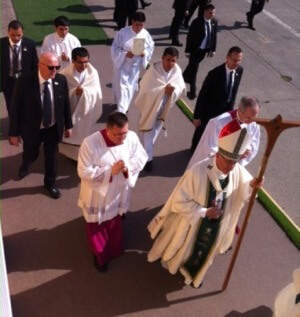
In a message before taking off from Rome on Monday, January 15, Pope Francis explained the purpose of his journey: “I will visit you as a pilgrim of the joy of the Gospel, to share ‘the peace of the Lord’ with all and ‘to confirm you in the same hope.’ Peace and hope, shared among all. I want to meet you, to look into your eyes, see your faces and be able to experience the closeness of God among all of you, His tenderness and mercy that embraces and comforts us.”
After arriving in Chile on Monday evening, Pope Francis celebrated a Mass for Peace and Justice on Tuesday morning, January 16, at Parque O’Higgins in Santiago. The Congregation’s schools and parishes in Chile were well represented at the Mass, which drew over 400,000 people. Many of those parishioners and students “woke up” as early as midnight to begin their pilgrimage to the city park.
Among those pilgrims were also several Holy Cross priests who concelebrated the Mass with the Holy Father, as well as two Holy Cross seminarians, Mr. Gabriel Fuentes, C.S.C., and Mr. Jose Ignacio Bustos, who were invited to serve as acolytes.
“It was incredible to experience Mass with my brothers in Holy Cross and our Holy Father Francis,” said Fr. David Halm, C.S.C., Director of Campus Ministry at St. George’s College. “His message of peace, reconciliation, and service was exactly what we needed to hear. Francis’s example and preaching give us new fervor.”
Watch videos and read texts of Francis's Visits to Chile and Peru
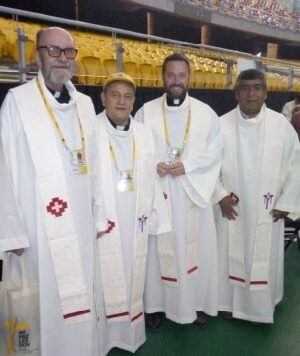
All of those Holy Cross religious then trekked quickly over to the Cathedral where they were joined by a larger group of Holy Cross priests and brothers to attend the address given by Pope Francis to consecrated religious, priests, and deacons. The visit to the Cathedral came immediately on the heals of Pope Francis’s moving encounter at the women’s prison in Santiago, where he focused on the message of reconciliation, rehabilitation, and reintegration.
Reconciliation remained a theme in the encounter with the consecrated men and women. The Pope began with the image of a disheartened Peter and the community, and he proceeded to speak frankly about the challenges and sufferings that the Church in Chile has borne in recent years.
Pope Francis called this moment of disheartenment or discouragement as “the hour of truth” for Peter and for the early community of the Church.
“As disciples, as Church, we can have the same experience: there are moments when we have to face not our success but our weakness. Crucial moments in the life of a disciple, but also the times when an apostle is born,” said Pope Francis.
“What is it that confirms Peter as an apostle? What sustains us as apostles?” continued the Holy Father. “One thing only: that we ‘received mercy.’ … We are not here because we are better than others; we are not superheroes who stoop down from the heights to encounter mere mortals. Rather, we are sent as men and women conscious of having been forgiven. That is the source of our joy.”
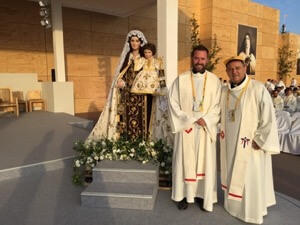
Even though the Holy Cross religious present for the pope’s message in the Cathedral spanned various generations, and included men from different cultures and backgrounds, all of them resonated deeply with the Holy Father’s message.
“In every moment I felt Pope Francis very close,” said Br. Joaquin Parada, C.S.C., who among other ministries works in the Pastoral Care of the Sick at San Roque Parish. “His message was an expression of humanity, which makes him feel closer to you. He presented the image of Peter as a sign of fragility, which is a concrete call to live the gospel and to head out in mission, overcoming whatever desolation.”
On Wednesday morning, Pope Francis flew south to Temuco for a Mass as well as a visit with the indigenous peoples who inhabit the Araucanìa Region of Chile, which has been the seat of number of clashes, some violent, over the years. The pope’s homily focused on creating a culture of encounter and truly listening to one another in order to share knowledge and begin moving to a reconciled diversity among peoples.
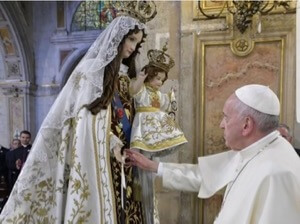
That afternoon Pope Francis returned to Santiago where seminarians from the Congregation’s International House of Formation in Santiago, Chile, had the chance to encounter the Holy Father at two different events.
First, at 5:30 p.m., Pope Francis met with Chilean youth at the Shrine of Maipú. Seminarian Fuentes attended the event along with other youth from the San Roque Parish, which is administered by Holy Cross. He described the encounter as “a motivating experience. The encounter with the Pope and the youth revitalized his vocation, and it reminded me of how powerful it is to gather together as Church in communion.”
Learn more about Holy Cross in Chile
Immediately following that event, the pope went to the Pontifical University of Chile, where the men in formation do their theological studies. Mr. Jean-Vital Blaise, C.S.C., a seminarian from Haiti who resides in the International House of Formation, was among the PUC students, staff and faculty invited to the address in which Pope Francis laid out a vision for Catholic education in which he spoke about developing an “integrating literacy.”
“This literacy process requires working simultaneously to integrate the different languages that constitute us as persons. That is to say, an education (literacy) that integrates and harmonizes intellect, affections and hands, that is to say, head, heart and action,” said Pope Francis. “This will offer students a growth that is harmonious not only at the personal level, but also at the level of society.
“We urgently need to create spaces where fragmentation is not the guiding principle, even for thinking. To do this, it is necessary to teach how to reflect on what we are feeling and doing; to feel what we are thinking and doing; to do what we are thinking and feeling. An interplay of capacities at the service of the person and society,” he said.
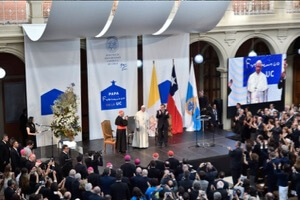
In words that ring true for all of the Congregation’s religious who work in the education apostolate, the pope concluded, “In our day, the mission entrusted to you is prophetic. You are challenged to generate processes that enlighten contemporary culture by proposing a renewed humanism that eschews any form of reductionism. This prophetic role demanded of us prompts us to seek out ever new spaces for dialogue rather than confrontation, spaces of encounter rather than division, paths of friendly disagreement that allow for respectful differences between persons joined in a sincere effort to advance as a community towards a renewed national coexistence.”
On Thursday on his way to Peru, Pope Francis stopped in Iquique to celebrate a Mass that focused on the reality of immigration, which has been growing steadily in Chile in recent years.
Reading these signs of the times, the Congregation’s District of Chile has opened new initiatives to reach out to immigrants, including a new program in San Roque parish that seeks to welcome the growing number of Haitian immigrants to the country. The program is run by Mr. Blaise and his fellow seminarian from Haiti, Mr. Widely Jean, C.S.C.
The pope arrived in Peru in the afternoon, and after the official greeting at the airport, thousands of people lined Avenida Brasil to welcome the pope as he traveled to the Papal Nunciature which would serve as his home base during his visit to Peru.
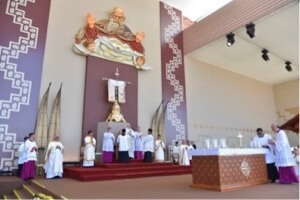
While many of the Congregation’s religious in Peru were able to participate in some of the apostolic visit’s events, two had a particularly close seat for all the events: the Most Rev. Jorge Izaguirre, C.S.C., Bishop Prelate of the Prelature of Chuquibamba, and the Most Rev. Arthur J. Colgan, C.S.C., Auxiliary Bishop of the Diocese of Chosica. As members of the Peruvian Episcopal Conference, they were able to accompany the Holy Father on his entire trip.
On Friday, January 19, his first full day in Peru, Pope Francis touched again on the theme of indigenous peoples and the environment with a visit to the country’s Amazon region and the city of Puerto Maldonado. The pope recognized the suffering of the native peoples and defended their right to a sustainable development that takes into consideration their ancestral relationship with the land and with nature. He also denounced the depredation of the forests and the waterways due to illegal mining and logging.
The next day, Saturday, January 20, the Pope headed north to the coastal city of Trujillo, which is in the heart of the region that was devastated by last year’s heavy rains and mudslides.
Francis spoke of how the Apostles experienced the power of nature when their boat was tossed about by the winds, and how the people of Peru had also experienced the devastating force of nature.
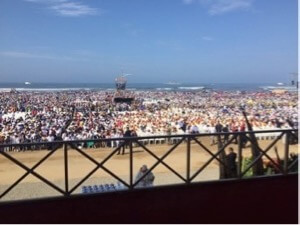
“Like the apostles, you know the power of nature, you have experienced its force. Just as the apostles faced the storm on the sea, you had to face the brunt of ‘El Niño Costero,’ whose painful consequences are still present in so many families, especially those who are not yet able to rebuild their homes. This is also why I wanted to be here and to pray with you.”
The Holy Father recognized that such painful experiences can test our faith, but also can strengthen it if we face the difficulties together. He praised the many manifestations of solidarity in the face of the natural disasters.
Learn more about Holy Cross in Peru
“The soul of a community is measured by how it manages to come together to face times of difficulty and adversity, in order to keep hope alive. By doing so, they give the greatest witness to the Gospel: ‘By this everyone will know that you are my disciples, if you have love for one another,’” he said.
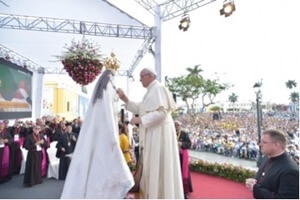
Another moving moment in the pope’s visit to Trujillo came in a Marian prayer service in the main square. People had walked in pilgrimage to Trujillo carrying their images of Mary and of the saints that are venerated in their northern communities.
Both Br. John Tryon, C.S.C., Assistant Novice Master, and Br. Anthony Terrones, C.S.C., who just professed his First Vows on January 6, 2018, traveled to Trujillo and participated in the Papal events there.
The Pope stayed in Lima for his last day in Peru. The busy schedule on Sunday, January 21, included a visit with the Peruvian bishops. Pope Francis held up the figure of the second Archbishop of Lima, Saint Toribio de Mogravejo, as a model for episcopal ministry. The Holy Father parised his closeness to the people and underscored the missionary zeal of the saint who travelled on foot and on donkey to the farthest reaches of his enormous archdiocese.
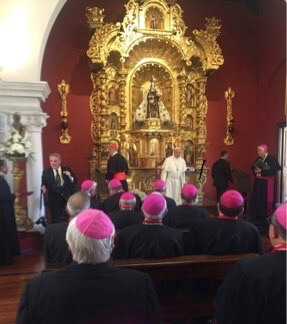
“Today we would call him a ‘street’ bishop,” said the Holy Father. “A bishop with shoes worn out by walking, by constant travel, by setting out to preach the Gospel to all: to all places, on all occasions, without hesitation, reluctance and fear. The joy of the Gospel is for all people: no one can be excluded.”
The day and the visit ended with Mass at the Las Palmas Air Force Base in the Surco neighborhood where a crowd of more than one million three hundred thousand people awaited him.
In that amazing crowd were many members of Señor de la Esperanza Parish in Canto Grande, which is the sprawling parish that serves as Holy Cross’ home base in Peru. Like their confreres in Chile, the Holy Cross priests in the District of Peru had the chance to concelebrate the Mass with the Holy Father.
In his homily, Pope Francis underlined how Jesus continues to walk in our cities and streets, “in order to rekindle the flame of hope and the aspiration that breakdown can be overcome by fraternity, injustice defeated by solidarity, violence silenced by the weapons of peace.”
“Like in the Eucharist in Trujillo, the silence and attentiveness of the people during the Eucharist was impressive,” said Bishop Colgan. “The silence was broken only on occasion by the singing of hymns and the shouting of hurrahs for Papa Francisco.”
Explore news of Holy Cross and the Universal Church
From the Mass, the Pope headed to the airport to return to Rome. Although his visits to Chile and Peru had ended, they left the local Churches, as well as the Holy Cross communities who serve in their midst, to continue the work of spreading the joy of gospel.
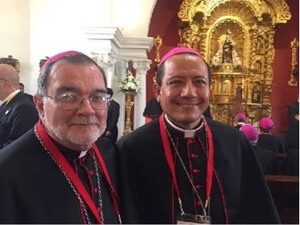
“One of the striking things about the Pope’s visit was the enthusiasm and joy that it generated in the people of Peru. It was evident in all of the large gatherings in the three cities that the Pope visited,” said Bishop Colgan. “The challenge for the Church is to see how this enthusiasm and joy can be sustained and channeled into a renewal of the Church’s mission and presence in the life of the people of Peru.”
“In the faces of the people who participated in all of Pope Francis’s activities one can see the joy, the excitement, and the enthusiasm. Meeting the Holy Father in person has been an indescribable experience,” echoed Mr. Jim Gutierrez, C.S.C., a Holy Cross seminarian from Peru. “They chanted the songs; they shouted ‘Francisco, friend, Peru is with you.’ It is a contagious joy that has revitalized the dormant faith of the Peruvian faithful. Thank you, Pope Francis, faithful friend.”